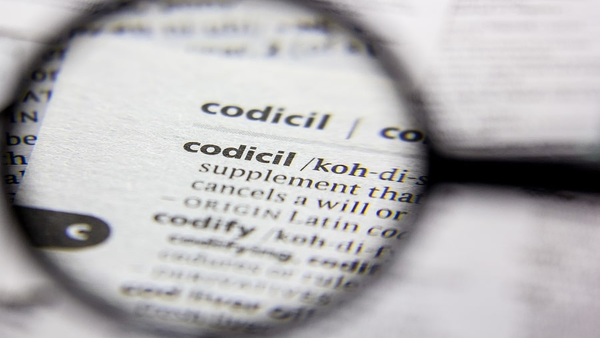If you’ve written a will or if you’re thinking of writing one, you might be wondering when it needs to be updated. After all, things change, and it’s important that your will still reflects your wishes even if your circumstances don’t stay the same.
When should I update my will?
The guidance is that you should review your will every 5 years and after every major change in your life or circumstances, and amend, update, or replace, your will if necessary.
Examples of major life changes could be:
- A change in marital status, such as getting separated or divorced, or getting married (note that in England and Wales, the latter will automatically nullify any will you previously made)
- Having a child or grandchild
- Changing address
- Having a significant change in financial situation
- If someone named in your will passes away or your executor has died
You should also review your will every 5 years just to check you’re still happy with what happens to your assets, and made amendments if you deem them necessary.
How do I make changes to my will?
If you’re only making small changes then you can just amend your existing will.
Once your will is signed and witnessed, all alterations have to be formally made using an official alteration known as a codicil.
A codicil is a relatively simple document that you can use to make changes to your will. There are no limits to what you can change using a codicil, but remember that the size and number of changes made will affect how simple the probate process is after you pass away, so if you’re making big changes or you’re making a lot of them, it might be better to write a whole new will.
When you make a change to your will using a codicil, you must get the change signed and witnessed in exactly the same way as when you write a will. The witnesses to the codicil do not have to be the same as the witnesses to the will. Anyone can be a witness for a codicil provided they (or their marital or civil partner) do not benefit from a gift in the codicil – to have them witness it would invalidate it.
Once you’ve made the change, if you gave copies of your will to other people it’s important to ensure they’re in possession of the most up-to-date version. You should ask them to destroy the old version just to be sure.
How many times can I amend my will?
There is no limit to the number of times you can amend your will with a codicil. However codicils are separate documents, so there is always the chance they could get lost or separated from the original will. As a result it’s a good idea not to have too many of them.
When is it necessary to write a new will?
You should rewrite your will for the sake of clarity if you’re going to need to make lots of changes, or if the changes are big. You should also write another will if you get married, as in England and Wales your old one will automatically become invalid.
If you write a new will it’s important to be clear that the new one is the one you want to be used when you pass away. You should explicitly state at the start that it revokes all previous wills, including codicils. You should also ensure you destroy all copies of the previous will.
If you decide to write a new will we can put you in touch with local solicitors and will-writers.
What if I forget to review or update my will?
If you forget to update your will following a major life change, your loved ones may not be adequately provided for after you pass away. Even if you think you’re happy with the contents of your will, it’s important to review it regularly as otherwise it could be argued that the will does not reflect your wishes.
This could be used as grounds to contest your will. However if it’s on record that you reviewed your will recently and confirmed you were still happy with it, it becomes harder to argue with.
It's also possible for benecificaries to apply for a deed of variation after you've passed away. This lets them make changes to an existing will to benefit those not included in the will, so long as every beneficiary agrees.
Don’t think of your will as something you do once and then forget about – it’s important it’s kept up-to-date with developments in your life, and that you check it regularly to ensure it still reflects your wishes. Doing so will make the process much easier for your loved ones when you pass away, and it will put your mind at ease.

